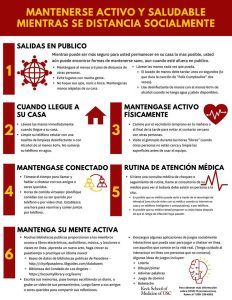Work Stability, Medical Access, Healthy Children and Status Top Their Concerns
Miguel Hernández* left his street fruit stall in Toluca, Mexico, and arrived in the United States four months ago. He came looking for a better future for his family because selling fruit was not enough to afford all their needs. In this country, he found the financial resources he needed to help them. Hernández worked in construction for three months and is now serving chips and salsa in a Mississippi restaurant. But the coronavirus has him scared in more than one way.
His biggest concern is being fired if his employer cuts expenses due to poor client attendance in the face of the health threat. “Everything was going well until the coronavirus panic scared customers away,” Hernández said this week.
Hernández earns $60 a day for nine hours of work. At the end of the month he has enough to pay the rent for a bed, and sends most of the money to his four children and his wife back in Toluca.
He has no health insurance, though. When he asked what he would do if he starts showing symptoms of coronavirus, he said he would go home to be cured by himself. “I will do my best to not pay for a consultation at a health center,” Hernández said.
One of the main concerns of undocumented immigrants in the face of the coronavirus is being out of money, so they continue to go out into the streets during the recommended quarantine. Some have savings to sustain themselves, but others do not.
Given the threat of the virus, people with symptoms have been ordered to go to their health-care provider, but the majority of undocumented people the Mississippi Free Press spoke to this week lack a health-care provider, and at the moment that is another of their major concerns.
‘I Don’t Have Insurance’
Carlos Quintero*, 29, leaves a Mississippi supermarket with his family after stocking up to face the quarantine. He has a huge 2013 Chevrolet truck where his wife and two young children ride with him. Quintero has been a construction worker for five years since he came to the United States looking to better support his family, and has some savings to support himself for a couple of months if the coronavirus quarantine is long.
However, Quintero is concerned about the coronavirus, saying that construction jobs have decreased because some do not want to leave their homes to work on construction sites. He is afraid that will affect his family’s finances in the long term.
Quintero, who does not have a health-care provider, is unhappy with the cost of the consultation to find out if he is sick with coronavirus. But he would be willing to go to a clinic if necessary.
“If I feel symptoms of coronavirus, I would go to a health center. I don’t have insurance, but I have gone before for accidents like cuts and things like that,” he said.
Quintero says that some medical centers allow uninsured people like him to establish a monthly payment plan after receiving emergency treatment, and says he must instead pay for an appointment in advance to determine if he is infected with the virus.
‘People Are Afraid to Go to the Doctor’

Karla Vázquez, a legal assistant at Elmore & Peterson law firm in Jackson and a member of the advisory board of the Mississippi Free Press, works with immigrants in Mississippi. Now, during the coronavirus outbreak, Vázquez is hearing four major concerns from immigrant people involving work, health insurance, care of their children and status issues that may discourage them from seeking medical care or testing.
Like people in this article, Vázquez says people are worried about their jobs. “What is going to happen with the small business owners’ stores, Hispanic stores; and people working in restaurants, construction or housekeeping,” she said.
Likewise, undocumented families are worried about how to seek and get medical care. “People are afraid to go to the doctor because they will not have money to pay the bills or the questions regarding their status,” she said.
Undocumented workers are especially worried about their children. “They can’t go to work and leave the kids at home, and they don’t have enough money to feed them three times a day plus snacks,” Vázquez said. “They are missing breakfast and lunch at school.”
Ultimately, concerns about legal status, and fears of being deported, can keep undocumented immigrants from seeking the care needed. “I think the main point is: keep explaining to them the severity of this virus and the need to follow instructions,” she said.
‘I Don’t Want to Cut Staff’
Alicia Lagos*, a Honduran woman who goes to the same market as Quintero, works as a housekeeper in a Pearl, Miss., hotel where she is less and less needed due to the shrinking attendance of clients because of the coronavirus.
In fact, Alicia has already gotten an additional job cleaning offices with which she hopes to solve her financial anguish during the recommended quarantine.
“The number of tourists is low, and my employer gives me fewer rooms to clean, so I took the new job,” said Lagos, who has been in America for 15 years and does not have health insurance. She says that if she suffers from coronavirus symptoms she would lock himself in her house before going to a hospital for fear of medical expenses.
Antonio Zambrano*, 53, employs undocumented workers. He told the Mississippi Free Press that if the losses continue for more than five months, it will no longer be profitable to maintain his business, the same challenge many locally owned businesses are facing. The first measure he would likely have to take, although he does not want to implement it, is to cut staff.
“I hope clients don’t panic because I don’t want to cut staff,” he says.
Zambrano arrived from Mexico 20 years ago to work, obtained American citizenship 15 years ago, and now has a health provider he will consult if he suffers from coronavirus symptoms, he said.
*Name changed
Email story tips from around Mississippi to lasnoticias@mississippifreepress.com.
Miguel Hernández* dejó su venta de frutas callejera en Toluca, México, y hace cuatro meses llego a los Estados Unidos. Vino a buscar un mejor futuro para su familia después de que su negocio quebró. De hecho muy pronto consiguió los recursos económicos que necesitaba para seguirlos ayudando. Trabajó en construcción por tres meses, ahora está sirviendo chips y salsa en un restaurante de Mississippi. Pero este buen panorama fue borrado por el coronavirus.
Su mayor preocupación es ser despedido si su empleador hace un recorte de gastos o cierra el negocio debido a la poca asistencia de clientes ante la amenaza del virus. “Todo iba bien hasta que el pánico por el coronavirus espantó a los clientes” dijo esta semana.
Hernández gana 60 dólares por nueve horas de trabajo diario y aunque al final del mes eso le alcanza para pagar la renta de una cama y para ahorrar unos dólares, envía la mayoría del dinero a sus cuatro hijos y a su mujer en Toluca.
No tienen seguro médico y cuando se le preguntó qué haría si sufriera los síntomas del coronavirus dijo que iría a curarse a su casa. “Haría lo posible por no pagar una consulta en un centro de salud”, aseguró.
Una de las principales preocupaciones de los inmigrantes indocumentados ante el coronavirus es quedarse sin dinero por lo que siguen saliendo a la calle durante la recomendada cuarentena. Algunos de ellos tienen ahorros para sostenerse pero otros no.
Ante la amenaza del coronavirus se ha ordenado que las personas con síntomas se dirijan a su proveedor de salud, pero la mayoría de indocumentados entrevistados por Mississippi Free Press carecen de proveedor médico y de momento esa es otra de sus grandes preocupaciones.
“No tengo seguro”
Carlos Quintero*, 29 años, sale con su familia de un supermercado luego de abastecerse para sobrellevar la cuarentena. Se sube a una camioneta Chevrolet 2013 con su esposa y dos pequeños niños. Quintero ha trabajado como obrero de construcción durante cinco años desde que llegó a Estados Unidos y tiene ahorros para mantenerse por un par de meses si la cuarentena es larga.
Sin embargo, Quintero también está preocupado por los malos efectos del coronavirus y dice que el trabajo en construcción ha bajado porque algunos no quieren salir de sus casas a trabajar en las obras. Piensa que a largo plazo esto afectará las finanzas de su familia.
Quintero quien tampoco tiene proveedor de salud se muestra descontento con el costo de la consulta para saber si está enfermo de coronavirus pero estaría dispuesto a ir a la clínica.
“Si siento síntomas de coronavirus iría a un centro de salud. No tengo seguro pero he ido antes por accidentes como cortadas y cosas así”, dijo.
Quintero señaló que en algunos centros médicos permiten que las personas sin seguro como él arreglen un plan de pago mensual después de ser atendidos por urgencias. En cambio, añadió, debe pagar una cita por adelantado para determinar si está infectado con el virus.






